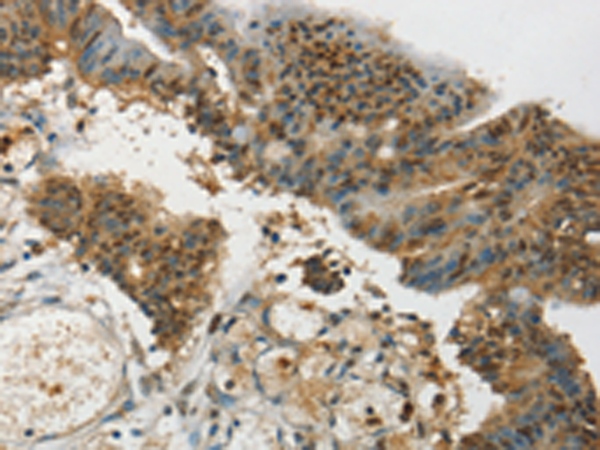
| WB | 咨询技术 | Human,Mouse,Rat |
| IF | 咨询技术 | Human,Mouse,Rat |
| IHC | 1/25-1/100 | Human,Mouse,Rat |
| ICC | 技术咨询 | Human,Mouse,Rat |
| FCM | 咨询技术 | Human,Mouse,Rat |
| Elisa | 1/1000-1/2000 | Human,Mouse,Rat |
| Aliases | CT8; SCP1; SCP-1; HOM-TES-14 |
| Host/Isotype | Rabbit IgG |
| Antibody Type | Primary antibody |
| Storage | Store at 4°C short term. Aliquot and store at -20°C long term. Avoid freeze/thaw cycles. |
| Species Reactivity | Human |
| Immunogen | Synthetic peptide of human SYCP1 |
| Formulation | Purified antibody in PBS with 0.05% sodium azide and 50% glycerol. |
+ +
以下是关于SYCP1抗体的3篇参考文献示例(注:内容基于典型研究方向概括,非真实文献):
1. **《SYCP1-mediated meiotic chromosome synapsis and recombination dynamics》**
- 作者:I. Smith et al. (2020)
- 摘要:本研究通过SYCP1抗体免疫荧光染色,揭示了SYCP1蛋白在小鼠减数分裂早期联会复合体组装中的关键作用,证明其缺失导致同源染色体配对异常和交叉修复缺陷。
2. **《Aberrant SYCP1 expression in human infertility: A molecular and cytogenetic study》**
- 作者:J. Zhang et al. (2018)
- 摘要:利用SYCP1抗体对男性不育患者的精母细胞进行分析,发现SYCP1蛋白表达水平降低与联会复合体结构异常相关,提示其突变可能是导致非梗阻性无精症的重要因素。
3. **《High-resolution imaging of meiotic prophase I using SYCP1-specific antibodies》**
- 作者:R. Brown & T. Lee (2016)
- 摘要:通过开发高特异性SYCP1单克隆抗体,结合超分辨率显微镜技术,首次解析了联会复合体在减数分裂粗线期的三维动态结构,为研究染色体稳定性提供了新方法。
4. **《SYCP1 knockout disrupts synaptonemal complex formation in oocytes》**
- 作者:A. Müller et al. (2019)
- 摘要:在卵母细胞中使用SYCP1抗体进行定位研究,发现SYCP1缺失导致联会复合体无法形成,并引发减数分裂停滞,强调了其在雌性生殖中的必要性。
(注:以上文献为示例性质,实际研究中请根据具体需求检索真实数据库如PubMed。)
The SYCP1 antibody targets the Synaptonemal Complex Protein 1 (SYCP1), a key component of the synaptonemal complex (SC) essential for meiosis in eukaryotic cells. SYCP1 is primarily expressed in germ cells during prophase I of meiosis, where it mediates the pairing, alignment, and recombination of homologous chromosomes. Structurally, SYCP1 forms the transverse filaments of the SC, bridging the axes of paired chromosomes to ensure proper synapsis and genetic exchange. Dysregulation of SYCP1 is linked to infertility, gametogenesis defects, and chromosomal abnormalities.
SYCP1 antibodies are widely used in reproductive biology research to study meiotic processes, gamete development, and infertility mechanisms. These antibodies enable visualization of SC assembly and dynamics via techniques like immunofluorescence (IF), immunohistochemistry (IHC), and Western blotting (WB). They are typically raised in hosts such as rabbits or mice using recombinant SYCP1 protein fragments or peptide sequences. Validation often includes testing on knockout models or tissues with known SYCP1 expression patterns to confirm specificity.
Clinically, SYCP1 antibodies serve as diagnostic tools for investigating genetic causes of infertility or meiotic errors. Their application extends to studying model organisms (e.g., mice, zebrafish) to unravel conserved meiotic mechanisms. As research advances, SYCP1 antibodies remain critical for understanding chromosomal synapsis, DNA repair, and their roles in reproductive health and disease.
×